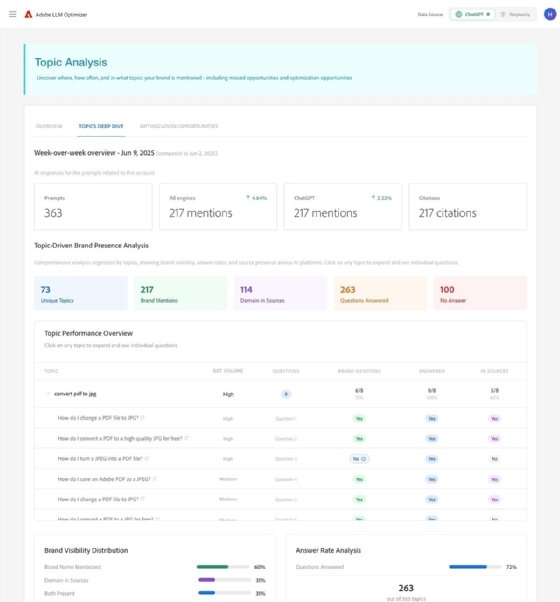
Getty Images
Adobe takes on AI search optimization with LLM Optimizer
SEO isn't dead yet, but new tools are needed to optimize content for generative AI search engines.
As if content marketers and e-commerce pros didn't already have their hands full optimizing content for search engines, they also now must optimize for AI answer engines such as ChatGPT, Perplexity and Gemini.
AI search optimization (AISO, also sometimes referred to as generative engine optimization or GEO) is an emerging science to go with search engine optimization (SEO). Adobe this week previewed a new standalone AISO application, LLM Optimizer, to analyze an organization's content and offer recommendations for better ranking with AI engines.
The application will be released soon, according to the company.
AISO is so new that marketers are just trying to understand the basics, said Gartner analyst Eric Schmitt.
Eventually, tools such as LLM Optimizer -- and likely competitors to come -- will automate AISO and make the content optimizations themselves, which humans will approve. For now, companies can get started manually by querying different large language model-powered AI answer engines to understand how their content and sites show up in search. They can then tweak and improve it, and check again next week.
None of the fledgling AISO software available now, whether from Adobe or a startup, has "any rocket science secret sauce in it yet," Schmitt said.
"We don't even know how these algorithms work on the answer engine side," he said.
Adobe said LLM Optimizer can customize content optimization recommendations to a point for different AI answer engines through AI pattern recognition. Brands may find that one engine is referring more traffic to their websites than others, and there might be value in optimizing for one over the other.
"This is one of those top things that all the CMOs are looking to figure out -- how can they remain relevant in the world of shifting channels … engage, get those eyeballs and influence," said Haresh Kumar, senior director of product marketing at Adobe. "If I can do those, then I can run the business."
Schmitt and Kumar said one key to AISO is knowing where your customers are on the web. For example, Google's Gemini relies on YouTube content more heavily than others, because Google owns YouTube. So if an organization's analysis shows its customers watch YouTube videos for information, optimizing for Gemini might be a good bet.

The nuts and bolts of AISO
Both SEO and AISO are complex, with many different facets of fine-tuning both content and sites. Many of the best practices that make content good for SEO, such as creating well-structured data and fixing broken links, also make it good for AISO. Backlinks -- where other pages link to yours -- still are important with both SEO and AISO to establish content's authority.
But they diverge in the realm of metadata and frequently asked questions documents, which AI engines weigh more heavily for relevancy. Furthermore, authoritative mentions on communities such as Reddit and GitHub, as well as Wikipedia and social media presence, also help with AISO.
Organizations must also optimize for questions people would ask an AI engine versus SEO's keyword-centric model. Finally, brands themselves can also be considered authoritative sources by LLMs -- for example, Nike, as an authority on shoes.
It's not over for the traditional web and SEO, though. Gartner's Schmitt and Adobe's Kumar both said they believe that today's search -- with ranked search results pages -- will exist side by side with chat-based AI search engines for some years to come, making both SEO and AISO important web traffic drivers for websites.
Gartner's Schmitt said his team members talk to marketers every day, and, in general, traffic to their sites is dropping. But marketers are also seeing increasing volumes of traffic coming in from answer engines. Some see more than others, depending on the category of company.
"Is it changing for consumer packaged goods or retailers? Maybe not so much," Schmitt said. "Is it changing for financial services, insurance, automobiles, travel? Absolutely, people are asking these engines to produce a travel itinerary for a Southeast Asian vacation. They sure are."
Don Fluckinger is a senior news writer for Informa TechTarget. He covers customer experience, digital experience management and end-user computing. Got a tip? Email him.







